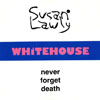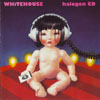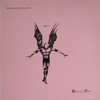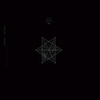- Administrator
- Albums and Singles
 On their third release, this Norwegian duo of Jostein Dahl Gjelsvik and Rune Andre Sagevik continue to channel an organic warmth that would stick out so blatantly in their cold homeland, mixing unidentifiable sounds with bits of traditional sounding music. Tele sounds like the natural follow-up to 2010's Sval, fleshing out the concepts there with a greater sense of polish and experience.
On their third release, this Norwegian duo of Jostein Dahl Gjelsvik and Rune Andre Sagevik continue to channel an organic warmth that would stick out so blatantly in their cold homeland, mixing unidentifiable sounds with bits of traditional sounding music. Tele sounds like the natural follow-up to 2010's Sval, fleshing out the concepts there with a greater sense of polish and experience.
Some of the tracks on Tele are less about music but seemingly more about experimentation and sound art.The microscopic percussive fragments of "Fnugg" and textural pops of "Gnesis" exemplify this: while the former is too brief of a piece to develop much, the latter works in deep, bassy pulses and bellowing, horn-like sounds that are less about melody and more about collage."Flint" also resembles a layering of bizarre sounds and effects in a more experimental context, complex but not messy.The deep blurps of sound and slightly noisy leads stand out, however, giving it a slightly different quality.
Things differ on "Skifer," with its low thump and ambience almost resembling conventional music, which is only increased by what sounds like clanging guitar here and there. "Granitt," also, with its rhythmic almost synth-like line, feels more musical, despite the abstract sounds and layers around, resulting in a varied, yet consistent singular piece.
Everything is encapsulated in the closer "Polar," which opens with a barren, industrial hum and a distant, bellowing foghorn.For the first half it sticks mostly to the open-ended, abstract pastiches of sound until a clanging and metallic, but melodic sequence pops up, bringing some guitar with it.While it in no way sounds conventional, the guitar and melody comes together to end the piece (and the album) on a much more musical note.
If there is a weakness to this album, it is a minor one.There does not feel like a consistent theme or feeling that brings all nine of the tracks together, so it does not feel like it completely gels.Now, that is not to say that this comes across like a random collection of sounds or tracks, because that is not the case either.Instead it is in some middle ground, not disjointed, but not overly cohesive either.Tele nicely balances the worlds of abstract, deconstructed sounds of unknown origin with some actual, albeit subtle, concessions to music and melody.What it lacks in overall cohesiveness, it makes up for in consistency.
samples:
 
Read More
- Administrator
- Albums and Singles
 Since his emergence from self-imposed exile in the late 1990s, Maurizio Bianchi has become extremely prolific, and even more so in the past few years. Like other artists who release this volume of material, I have only dabbled here and there amongst his contemporary. The newer material is more in-line with the sound art and ambient worlds than his older MB material was to the then-burgeoning industrial and power electronics scene, and judged on its own merit, is quite good, as is this album here.
Since his emergence from self-imposed exile in the late 1990s, Maurizio Bianchi has become extremely prolific, and even more so in the past few years. Like other artists who release this volume of material, I have only dabbled here and there amongst his contemporary. The newer material is more in-line with the sound art and ambient worlds than his older MB material was to the then-burgeoning industrial and power electronics scene, and judged on its own merit, is quite good, as is this album here.
Celichants is his latest work, a single hour-long piece that, as near as I can tell, has little to do with Irish culture.Instead the piece is dedicated to Isadore Ducasse (aka Comte de Lautreamont). It features photo-cards of stone formations and an esoteric, likely cut-up surrealist text from Bianchi, illuminating nothing overtly about the album.
Consistent with his old MB releases, there is a huge amount of delay and reverb covering everything, in this case the most overt source material being the human voice, fragmented and masked as to only vaguely resemble its source.Occasional hints of conventional music seem to rise to the surface but just as quickly drift away into the murky space.At one point it almost sounds like bagpipes appear (or samples thereof), leading to the denser, heavier moments to be heard, and perhaps the Celtic part of the title.
While the first half has a distinctly cold, disconnected feel, the second half drifts into darker spaces, obscured by waves of sound that blur distant, unidentifiable noises.Even though there are a few hints at melody that come up, it mostly stays hidden and masked in the darker layers of effects and ambience.The closer is a bit more spacey and stereotypically electronic, with clattered crashes and bangs to end on a disjointed note.
I will admit, the work of Maurizio Bianchi does not grab me in the same way that the work as MB did in the early 1980s does.In all fairness, it is simply a change in approach and style rather than quality.The work Bianchi did as MB (Symphony for a Genocide, Menses, etc) was intentionally depressive and bleak, with a certain rawness that let it fit in nicely with the early noise and power electronics scene, though his contemporaries were far more angry and violent in comparison.His newer work is by no means all puppies and sunshine or trite new-agey dreck, but it does not have the same intensity as his older albums.
Celtichants is more in league with the work of Aube, with whom he has collaborated.There never is a specific feeling or emotion conveyed, just a deconstruction/reconstruction of sound, which he does very well.With his multitude of releases and collaborations, I can not speak to how this fits in overall, but those familiar with Bianchi's more recent work surely will not be disappointed, although they will not be surprised at what they hear either.
samples:
 
Read More
- Administrator
- Albums and Singles
 These two albums are two thirds of what I consider to be Whitehouse's most idiosyncratic, and therefore most compelling phase in their 26-plus years of activity. Culminating with 1995's Quality Time, which I have discussed at length before, the phase began here, with probably their most musical and understated (in relative terms, of course) works, respectively.
These two albums are two thirds of what I consider to be Whitehouse's most idiosyncratic, and therefore most compelling phase in their 26-plus years of activity. Culminating with 1995's Quality Time, which I have discussed at length before, the phase began here, with probably their most musical and understated (in relative terms, of course) works, respectively.
Quality Time was my initial exposure to Whitehouse, but by the time 1998's Mummy and Daddy was released, I had pretty much already digested much of their discography.Looking over their body of work, I see four distinct phases in their albums, from lyrics to vocals to the noises that which accompanies them.
The first phase, beginning with 1980's Birthdeath Experience up until 1983's legendary Right to Kill perhaps shows their greatest and most productive evolution.At that point, consisting of William Bennett and whomever he was acquainted with at that time (including Steve Stapleton for a few live performances), the band went from an atonal anomaly: in a modern context, Birthdeath Experience and Total Sex sound almost quaint; to a violent monstrosity:New Britain and Right to Kill are just as powerful and disturbing 30 years later.
The "second coming" as it was heralded at the time began with 1985's Great White Death and saw the band as a power trio of sorts:Bennett in the lead, backed by author Peter Sotos and Kevin Tomkins (then formally, and now once again currently of Sutcliffe Jugend).For better or worse, this is the album (and era) that they have been pigeonholed from:the once buried and inhumanly distorted vocals were brought up-front, coupled with lyrical content centered on aggressive, almost misogynistic sexuality.The sound and approach stayed rather consistent up through 1990's Thank Your Lucky Stars and 1992's Twice Is Not Enough, and seemed to edge into self-parody and humor at times: I have always had problems taking the David Tibet co-written title track from the former with any kind of seriousness.
Moving ahead, the fourth era is one of vicious digital noise that began with Mummy and Daddy and lasting through Asceticists 2006; eventually defined by untreated, but ranting, berating vocals traded off between Philip Best and William Bennett like two deranged psychotherapists to brilliant effect, and also a period of greater experimentation (sound collage, spoken word, percussion, etc).
Going backwards, the third period of Whitehouse is the more diverse, idiosyncratic one. The phase began with 1992's Never Forget Death, ostensibly a William Bennett solo album:the meticulous studio recording documentation on the Susan Lawly site credits no one else except him and Ott Blumenkraft, who mostly works in far more conventional genres, as a co-producer.Perhaps it was that co-production, because the three long tracks that make up the bulk of the album hint occasionally at traditional electronic music, for example:the undulating synths behind the title track eventually lock into some sort of perverse approach to techno.Maybe this was one of the earliest appearances of DJ Benetti and his love of Italo Disco.
Vocally, there a balance between the first two phases:lots of effects, but still mostly intelligible lyrics, with less of an emphasis on the sex and more on the violence."Now Is The Time" combines lyrics from "Right to Kill" with references to Bret Easton Ellis’ American Psycho…at least that is the only reason I can fathom Bennett name-checking Huey Lewis, Genesis, and Whitney Houston, atop a droning electronic backing that again exhibits an oddly rhythmic quality and an overall almost pleasant structure, barring the occasional harsh feedback swell.
The high point of the album for me is "Asking For It," which begins as a rather calm, narrative-like lyrical structure that devolves into hysterical, but menacing screams and harsh condemnations by the end.This is paired with an aggressive, but not overly noisy synth rhythm that varies and fluctuates perfectly with the vocals to come together beautifully.For all the criticism of their work, this ten minute piece alone is anything but just random noise with screaming:it is tightly and as effectively constructed as any post-whatever genre's stab at an epic-length song, and likely better.
The album's closer, "Torture Chamber" was marked with a disclaimer on both the original CD pressing and its current form (as the second half of the Twice Is Not Enough Special Edition disc) that it was not to be played loudly. While that seems almost comical for a Whitehouse album, one play through of the track justifies the warning.Beginning as a pure noise piece, more in line with Hijokaidan or the Incapacitants, the volume spikes to absurd proportions in the final 30 seconds, most likely into and far past the maximum threshold for digital media.
samples:

The subsequent follow-up, 1994's Halogen is both a return to the old and a new direction.Once again Bennett is assisted by Peter Sotos lyrically, resulting in some of the more complex vocal themes up to that point, while the synths are just awash in a sort of gauzy reverb that smooths out the cleaner sound, likely due to the Steve Albini production.It is still by no means peaceful, but has a more introspective feel compared to their other work.The almost pleasant synth sounds from Never Forget Death are but gone, replaced by unique analog textures that would reappear splendidly on Quality Time.
"Lightning Struck My Dick," despite its sophomoric title, delves lyrically much deeper, pulling in social commentary into the prostitution-tinged lyrics, and I assume with input from Sotos, given the wording is rather consistent with his writing.The vocals are pretty low and somewhat buried amid the ripping cloth synthesizers and explosions, but understandable.Similar is the title track, which opens with warbling feedback that, a few decibels lower, could actually be beautiful sounding.Even when the guttural, chugging synth and sampled Thai pop songs pop up, it is pretty placid.However, about half way through it takes a decidedly sinister turn.
Interspersed amongst these are a few straight up noise pieces, "Movement 1994" (a call-back to New Britain's "Movement 1982" and later revisited as "Movement 2000"), is a monochromatic burst of white noise, with little in the way of variation or dynamics that is short enough to not outstay its welcome."Dictator", on the other hand, is a low frequency synth throb with piercing noise stabs on top, and largely indecipherable vocals shouted throughout.
The most significant departure from not only the album, but their entire catalog, is the closing "The Way It Will Be." It is a brief, melancholy ambient track with poetic, spoken words:"I should like to live forever/Suns may rise, and suns may set/But you and I shall never more return to Earth."It is unlike anything else they ever did, or would do again, which is one of the reasons it is so striking.
Whitehouse is one of those few long-standing projects that I can pretty much jump into their back catalog at any point and enjoy on any given day.Personal preferences may shift depending on mood, but I do not find any album to be bad or weak by any means.The third phase trilogy (Never Forget Death, Halogen, and Quality Time) just always seems the most overlooked and under-appreciated to me, with so much of the focus on their career focused on either being among the first "noise" bands (the first phase), or their sexualized lyrics in the mid to late 1980s.I know before I heard the entirety of Quality Time, I had a lot of negative preconceived notions about the band that, once I actually listened to them, were tossed away.Anyone who has demonized Whitehouse based on second-hand information should listen for themselves and make up their own mind.
samples:
 
Read More
- Administrator
- Albums and Singles
 Over at their Bandcamp site, the Legendary Pink Dots are in the process of making available remasters of the ENTIRE catalog from the band's history. Right now the current focus is on the "main" albums, and the band has already made available Brighter Now, Curse, Faces in the Fire, The Golden Age, The Maria Dimension, and Shadow Weaver & Malachai.
Over at their Bandcamp site, the Legendary Pink Dots are in the process of making available remasters of the ENTIRE catalog from the band's history. Right now the current focus is on the "main" albums, and the band has already made available Brighter Now, Curse, Faces in the Fire, The Golden Age, The Maria Dimension, and Shadow Weaver & Malachai.
Edward Ka-Spel has informed us that "When we get to titles like Nemesis Online and 9 Lives To Wonder, we will include bonus LP-only material mastered from the original tapes. When we get to cassette releases, we will present them in the original versions," citing Chemical Playschool collections being restored to their original full length duration.
There is possibility that Tear Garden and other non-LPD projects may be included in the remastering project but the main LPD material is going to remain the focus for now.
Edward adds, "If compilations are eventually remastered we'll probably make them free downloads. Now off to my see my 2 sons in Nijmegen!"
To hear the available remasters as well as some other exclusive music, please visit http://legendarypinkdots1.bandcamp.com/
Read More
- Administrator
- Albums and Singles
 After so many albums, I fear that someday Aaron Moore and Daniel Padden will stumble but thankfully with their latest album they prove that they are still firing on all cylinders. As varied as expected, Golden Rhythm/Ink Music is an exciting and gripping exploration of barmy improvisation and deeply intense, almost ritualistic, music. It does not reach the dizzying heights of early Volcano the Bear but it is definitely one of the best things they have done since coming back in from the cold a few years ago.
After so many albums, I fear that someday Aaron Moore and Daniel Padden will stumble but thankfully with their latest album they prove that they are still firing on all cylinders. As varied as expected, Golden Rhythm/Ink Music is an exciting and gripping exploration of barmy improvisation and deeply intense, almost ritualistic, music. It does not reach the dizzying heights of early Volcano the Bear but it is definitely one of the best things they have done since coming back in from the cold a few years ago.
The opening piece "Buffalo Shoulder" might have a good pun in the name but it is an inauspicious start to what reveals itself to be a solid album. It is the second track, "Baby Photos," where things kick off. "Baby Photos" is a terrific bit of weirdo pop that could have come straight off Meet the Residents. The deranged rhythm is impossible not to jerk my body to; the epileptic percussion reinforced by what sounds like a thumb piano to give it a colorful, off-kilter vibe. All the while the vocals are wonderfully surreal, and incredibly catchy.
After that bit of madness, "The Great Reimbursement" calms things down for a bit with a slow burning voyage through some trippy sounds. The vocals take on a distant, euphoric quality like Moore and Padden are calling to me through a dream. A dream that well and truly shatters with the bizarre "Bravo," which I either love or hate depending on my mood when I am listening. From this point on, the duo take their scatter-gun approach and confound expectations and taste further with a number of short and strange pieces that sound like incidental music for a radio play Max Ernst never got to write.
Golden Rhythm/Ink Music finishes with the superbly hypnotic "Fireman Show." The guitar drags me along and plants me down in front of Moore and Padden while they shout at me and everything else furiously explodes. What more could I ask for? Even if the rest of the album were completely throwaway (and believe me, it is not), it would be worth the price of admission for this piece alone. By the time everything comes to a standstill, I am ready to hit the skip back button and start this album over one more time.
samples:
 
Read More
 After so many albums, I fear that someday Aaron Moore and Daniel Padden will stumble but thankfully with their latest album they prove that they are still firing on all cylinders. As varied as expected, Golden Rhythm/Ink Music is an exciting and gripping exploration of barmy improvisation and deeply intense, almost ritualistic, music. It does not reach the dizzying heights of early Volcano the Bear but it is definitely one of the best things they have done since coming back in from the cold a few years ago.
After so many albums, I fear that someday Aaron Moore and Daniel Padden will stumble but thankfully with their latest album they prove that they are still firing on all cylinders. As varied as expected, Golden Rhythm/Ink Music is an exciting and gripping exploration of barmy improvisation and deeply intense, almost ritualistic, music. It does not reach the dizzying heights of early Volcano the Bear but it is definitely one of the best things they have done since coming back in from the cold a few years ago.
- Administrator
- Albums and Singles
 Drawing on literary influences like Franz Kafka and Thomas Ligotti, Mat Sweet returns with an EP about the purgatories and hells that are jobs in the bureaucratic machine. Undoubtedly inspired by the continuing financial crises that have erupted like boils across the world, Sweet has created a concise and precise indictment of the men in suits who have done as much damage to the world as men in military uniforms and priestly robes in past decades and centuries.
Drawing on literary influences like Franz Kafka and Thomas Ligotti, Mat Sweet returns with an EP about the purgatories and hells that are jobs in the bureaucratic machine. Undoubtedly inspired by the continuing financial crises that have erupted like boils across the world, Sweet has created a concise and precise indictment of the men in suits who have done as much damage to the world as men in military uniforms and priestly robes in past decades and centuries.
It does not take a genius to work out that Sweet is not a fan of working in an office as, from the moment "Temping" begins to the point where it reaches a gorgeous and classic Boduf Songs ending, it is possible to hear the disdain, ennui, and disgust he has for the great, grey side of industry. The other songs reinforce the parasitic and Machiavellian side of those who aim high in big business; on "Infernal Memo," Sweet bitterly intones: "I will kill every dog/And build a tower from the bones, the bones" There is a desperate sense of the constant devouring of individuals by the larger company, all for no real gain even for those at the top of the food chain.
While these ideas have been done to death, particularly in American literature with everyone from the aforementioned Ligotti to Don Delillo covering similar terrain in prose, Sweet’s visions sound remarkably fresh and fit with his previous (equally bleak) releases. Yet despite the grim reality of Internal Memo’s content, Sweet has softened the delivery compared to Boduf Songs’ last album, This Alone in Spite of Everything. "Eternal Memo" could easily be written for Low (especially that delicate guitar solo that appears halfway through) and the lurking threat present in Sweet’s lyrics is reminiscent of Low’s equally angry The Great Destroyer from 2005.
While Internal Memo is great, it is far too short. I sincerely hope this is only a taster of a new Boduf Songs album as I have been itching for one almost since the last one. However, better to be moaning about how short a new release is than the complete lack of one, especially when Internal Memo is so good.
samples:
Read More
- Administrator
- Albums and Singles
 Out of all the Sleep albums, the one I would think was least in need of a remaster was Dopesmoker but here we are with a third version of the album (and another artwork change). However, once I got to hear this latest edition of the album, I can understand a little why the band wanted to clean it up. It certainly sounds better than any previous incarnation (though it definitely looks the worst out of all of them) and it is another good reason to talk about this masterpiece.
Out of all the Sleep albums, the one I would think was least in need of a remaster was Dopesmoker but here we are with a third version of the album (and another artwork change). However, once I got to hear this latest edition of the album, I can understand a little why the band wanted to clean it up. It certainly sounds better than any previous incarnation (though it definitely looks the worst out of all of them) and it is another good reason to talk about this masterpiece.
The story of this album should be fairly common knowledge but a quick recap for the uninitiated: after having moderate success with their album Holy Mountain, Sleep were signed to London Records for a large sum of money with the promise of artistic freedom. When London Records heard the subsequent album, they were understandably upset because how on earth were they going to market an hour-long piece of music about weed? The various debacles surrounding Dopesmoker ended up splitting the band. Al Cisneros and Chris Hakius reunited a few years later to form Om, and Matt Pike went down a more traditional metal route with High on Fire.
In the meantime, one version of the album was made available semi-officially in the form of Jerusalem. A shorter recording than the original given to London Records (Jerusalem was Sleep’s idea of a compromise), it was a raw and powerful document of a band transcending any idea of them being another stoner metal wannabe Black Sabbath. When Dopesmoker was finally released in 2003, the extra ten minutes or so of music was restored and the mix was a much tighter, more polished job. While it sounded great, I always found myself returning to the rougher edges of Jerusalem.
So now in 2012, here is another version of Dopesmoker yet again billed being presented as the band originally wanted it (I remember that being the billing for the 2003 version). This remastered edition does not take any of the polish off this particular version but it certainly sounds bigger than the 2003 edition. There seems to be better separation between the different members of the band, Cisneros’ vocals slightly less muddy (but still carrying all the energy of a dinosaur’s roar). It is not a huge difference but it certainly puts Kevin Shields’ recent "remastering" of the My Bloody Valentine releases to shame!
Moving away from historical and dry talk of mastering, Dopesmoker remains something much more than an album or a song. Yes, this is all about weed, and as everyone knows, stoners tend to be extremely boring when they get onto the topic of their favorite drug. Describing it to friends who are not into this kind of music, I find my words fall flat and I make it sound like Dude, Where’s My Car? with a distortion pedal. Listening to more than a couple of minutes of Dopesmoker reveals a very different story. Alchemically distilling the essence of Sabbath into one riff to end all riffs, Sleep create an ecstatic, religious pilgrimage through an imagined version of the Holy Lands where the air hangs thick and heavy with hashish smoke like incense at a mass.
The blending of religious themes and a drugged out state of mind brings to mind the practices and mysticism of Sufi Islam (and certainly fits with Cisneros’ output with Om with titles like Pilgrimage and God is Good, as well as strong middle Eastern and Eastern themes running through the music). The cover of the second edition of Jerusalem makes this link more apparent: a holy man prostrates himself in front of a burning flame. To Sleep, cannabis is a sacred gateway to a higher level of consciousness and through repetition, sustained notes and volume they use their music to tap into this state. Like La Monte Young or Coil, Sleep’s music is another way to change your perceptions and reach some form of psychedelic release. Granted it is in a very different vein to those artists, but the effect is similar.
The riff itself is hypnotic to the point of absurdity. The three players breathe smoke-laden air into the music, the sound waves themselves becoming more than just disturbances in pressure. When Pike’s guitar solos kick in, it feels like a shedding of weight as the music reaches out and grips me. Cisneros’ vocals are somewhere between a visionary chant and his deadpan delivery on earlier recordings. Taken altogether, the whole is far more than the sum of its parts as Dopesmoker expands beyond Earth and blasts off into the cosmos.
Like the 2003 release of Dopesmoker, this version also comes with a bonus live track. Unlike the cracking version of "Sonic Titan" on the previous issue, here we have a rough recording of "Holy Mountain" from 1994. The sound quality is atrocious and as good as the performance is, I cannot get past the poor recording. Personally I would have preferred if the album just contained Dopesmoker and perhaps an official version of the Volume Two live boot, or if decent remasters of the older albums were issued with this version of "Holy Mountain" as a bonus on one of those. Here it makes no sense and kills my buzz, man.
samples:
Read More
- Administrator
- Albums and Singles
 Few albums are as successful pulling off an album's worth of music wrapped into a single song as Sleep were in the '90s. Their sprawling weedian travelogue, Dopesmoker, set an impossibly high precedent for bands looking to follow the album-length song format. For Italy's Ufomammut, that precedent sounds more like a challenge to raise the bar, in which case, instead of just one... why not release two back-to-back albums in one year, together encompassing a single mammoth song 90 minutes in length?
Few albums are as successful pulling off an album's worth of music wrapped into a single song as Sleep were in the '90s. Their sprawling weedian travelogue, Dopesmoker, set an impossibly high precedent for bands looking to follow the album-length song format. For Italy's Ufomammut, that precedent sounds more like a challenge to raise the bar, in which case, instead of just one... why not release two back-to-back albums in one year, together encompassing a single mammoth song 90 minutes in length?
Neurot (CD) / Supernatural Cat (LP)
If that sounds forbidding, fear not, because Oro: Opus Primum is actually a hell of a lot more welcoming, and immediately listenable, than Dopesmoker. As far as album-length songs go, it plays out more like the variety found on the doom-tinged sludge of Melvins' Lysol: in essence, it's intended to hypnotize and rock out in equal measure. Ufomammut play a brand of sludgy, immensely heavy doom metal spiked with psychedelia and cosmic overtones, and the variation within that hybrid sound gives them room to bounce between meditative riffs, oscillating drones, and blown-speakers RAWK! with ease. On Opus Primum, there are synth-driven moments that veer toward Pink Floydian spaciness, enough whooshy psychedelic noises to make Kawabata Makoto salivate, and distorted spoken-word samples that sound as if picked up from an alien radio station.
Opus Primum is split up into five parts on disc, and there are enough stylistic differences between the parts to keep things engaging. Opening piece "Empireum" is a slow-building intro stretching 14 minutes, the simple music-box melody at the start layered over with drums, psychedelic synth washes, and a thick, muscular, one-note riff that is as heavy as anything under the Sunn O))) [sic]. That key melody is reprised on "Magickon," which integrates more muscular drumming and bass playing to take the heaviness one step further. There is a distinctly psychedelic vibe running through the ambient parts of the album—not in the wistful, doe-eyed sense you'd hear on a Flaming Lips album, but like Al Cisneros' effort with Om to reach higher planes of consciousness. It's an effective contrast to the parts of Opus Primum that are notable for just how fucking ENORMOUS they manage to sound, like centerpiece "Infearnatural," which sounds like a black hole collapsing in on itself.
This is not Ufomammut's first time tackling a project of this proportion: the band has become progressively more ambitious with each release, and 2010's Eve—also a five-part, album-length song—hung together remarkably well. The most impressive aspects of Opus Primum, as compared to Eve, is the sense of patience, pacing, and eventual payoff. The rising tide at the start—the aforementioned "Empireum"—segues into the album's early peak, "Aureum," a monstrous 12-minute segment that doubles down on its tempo halfway through. Whereas most of the album leans toward a cosmic, mind-expanding slow-drip of riffage—like if Sunn O))) fashioned their obelisk drones into song structures—"Aureum" releases the tension built by "Empireum," going lighter on psychedelia and heavier on straight-up rock action. That sense of dynamics, with well-timed fluctuations in tempo, riffs, and tone, is key to Opus Primum's success as it steamrolls forward.
Bassist Urlo shed light on the decision to split Oro into two halves in a recent interview: "I've never liked albums that are too long. [...] As it's a very long song, we thought it was a good idea to split it in two parts, to give each one time to assimilate with the listener." Just like with Earth's Angels of Darkness, Demons of Light albums, the decision is a wise one: I have kept Opus Primum on repeat all spring, to the point I now catch myself humming key riffs at times without the album playing. At 18 minutes, it is easily digestible in one sitting. Each of the five parts functions as a "song" of its own, but there is a noticeable ebb and flow to the presentation and sequencing, so that Opus Primum makes perfect sense as a single, long-form song as well. That said, there is something undeniably awesome about bands that don't stop trying to top themselves in ambition with each release. Sleep did it, and then split up after recording Dopesmoker, their magnum opus. Ufomammut are at the height of their powers, and I'm curious to hear whether Opus Alter can push these ideas even further.
Samples:
Read More


 (will be finished next week)
(will be finished next week)